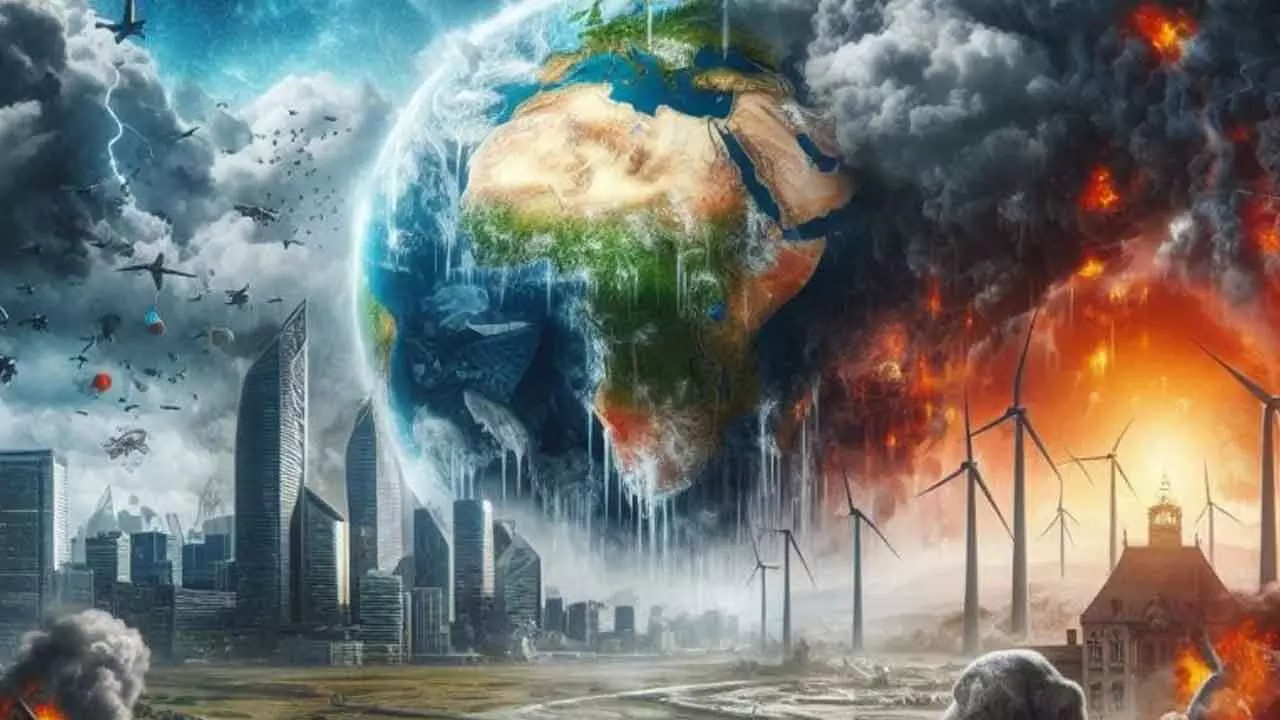Live
- Bhumana condemns police case against former MLA
- Deadline for payment of Haj second installment extended
- Tirupati MP demands Vande Bharat sleeper train to Vizag
- BRS seeks privilege motion against State govt over inflating debt figures
- Cong calls for ‘Chalo Raj Bhavan’ over Adani issue tomorrow
- TDP seen becoming strong in rural areas
- PCC’s Hyd’bad exec meeting turns stormy as netas clamour for posts
- Inter-state drug racket busted, 3 held with Rs 1.2 cr worth poppy straw
- Hyderabad: Police nabs drug peddler, seize MDMA worth Rs 1.78 lakh
- Hyderabad: Traffic curbs for President’s visit today
Just In
2024 marks a confluence of climate skeptics


Despite the defiant in-your-face ‘all is well’ stance, especially of rich nations, climate change is a clear and present danger to the humanity, and...
Despite the defiant in-your-face ‘all is well’ stance, especially of rich nations, climate change is a clear and present danger to the humanity, and the life itself on the planet. Dry regions are be-coming drier and wet areas wetter. In dry regions, water is evaporating more quickly, and in-creasing both the intensity as well as duration of periods of drought.
We only have to look around and learn that droughts can occur anywhere, though their onset is slow, lulling people as well as governments into complacency. But, once they set in, they start wreaking havoc on health, agriculture, livelihoods and economies, energy and the environment. According to the World Health Organisation (WHO), water scarcity impacts 40% of the world’s population, and as many as 700 million people are at risk of being displaced as a result of drought by 2030. Drought plagued South America and Africa in 2024, while parts of other con-tinents were dry.
No matter which country you look at, it is common now to hear farmers complain of low levels of soil moisture and groundwater levels. Amid this bleak scenario comes the dismal news that even after deliberations for 12 days, the United Nations Convention to Combat Desertification (UNCCD), known as COP16 (attended by 196 countries and the European Union), has just ended in Riyadh without any deal on how to respond to the expanding scourge of drought.
The parties, i.e., member-nations, however, agreed on one thing – that they need more time to discuss the most pervasive and the most disruptive environmental disaster which is costing the world more than $300 billion every year. A UN report released at the meet said droughts would affect 75% of global population by 2050. Yet, the conference decided that a future global drought regime could be arrived only during the COP17 meet in Mongolia in 2026.
The Riyadh talks failure comes after the partial success of biodiversity talks in Colombia, the failure to reach a UN deal on plastics pollution in South Korea, and a climate finance deal that disappointed developing nations at COP29 in Baku, Azerbaijan.
The crux of the matter is that the woes of planet are to a large extent rooted in the climate irre-sponsibility of rich nations. After emitting the majority of greenhouse gases since the Industrial Revolution era, they are shrugging off their responsibilities, and duty, of coming to the aid of developing countries. The solution is either to shun or cut back on lifestyles that are character-ised by high energy use and carbon-intensive consumption.
Despite making pledges in the 2015 Paris Agreement (pledge to try and prevent global tempera-tures rising by more than 1.5C), the rich nations are not meeting their commitments, raising concerns about their accountability and sincerity. Add to it, their MNCs make false or mislead-ing claims about a product or service’s environmental benefits, which came to be known as ‘Green Washing’. Plastic is a great example.
At this juncture, it is worth poring over what Paul Krugman, an eminent economist, contends: “The deniers are choosing, willfully, to ignore that threat, placing future generations of Ameri-cans in grave danger, simply because it’s in their political interest to pretend that there’s nothing to worry about. If that’s not betrayal, I don’t know what is.” This is true of all rich nations.
All disasters so far during 2024 point out the record-level occurrence of natural hazards such as floods, glacial outbursts, groundwater depletion, drying up of springs, droughts, tropical cy-clones, heat waves and severe storms. As rich nations and their firms feign ‘all is well’ – even as disasters lie in wait... to sneak in or pounce upon at once – people as well as governments in developing countries need to scale up climate activism as well as activities to stem the tide of climate change.

© 2024 Hyderabad Media House Limited/The Hans India. All rights reserved. Powered by hocalwire.com






